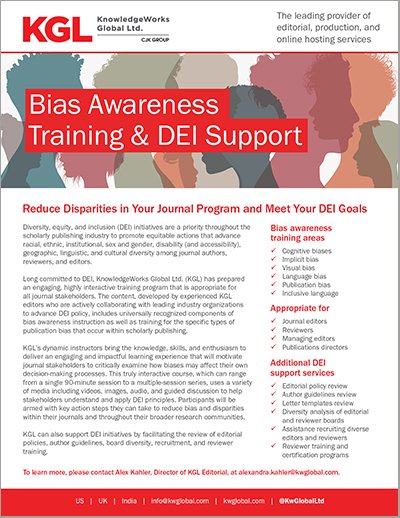Bias Awareness in Scholarly Publishing
/by KnowledgeWorks Global Ltd.
Earlier this year, we published a report entitled Diversity, Equity and Inclusion in Educational Content: What You Need to Know Now, providing publishers with a starting point and ongoing solutions for how to make their content more representative of the audience engaging with it.
As publishers and their stakeholders begin to work toward making their content more inclusive, one of the most difficult challenges they face is not recognizing their own implicit biases and how they might impact the quality and reach of their publications.
Implicit biases occur automatically and unintentionally, which is why they are often difficult to identify and measure, to understand how they influence the way we act and behave, and even to see how our behavior impacts how others behave. And they are incredibly pervasive. As social psychologist Anthony Greenwald of the University of Washington and long-time researcher on implicit biases noted in an interview with Knowable Magazine, “Most people have multiple implicit biases they aren’t aware of. It is much more widespread than is generally assumed.”
Types of implicit bias
Visual bias: One aspect of implicit bias is visual bias, which is defined by how facial characteristics, expectations, and irrelevant information can impact cognitive processing and perceived trustworthiness and competence.
Spoken language bias: Another area of bias is spoken language bias. The way a voice sounds, or a type of accent, can signal social categories and impact decision making.
Impact of implicit bias
These implicit biases can have several effects, including the Pygmalion effect, where the behavior of Person B changes based on the expectation or belief inside Person A’s mind; and the Attractiveness Halo Effect, where a person’s perceived positive qualities affect one’s judgment of their other qualities.
Bias in scholarly publishing
When it comes to academic and research publishing, there are many examples of how these biases impact the publishing process and challenge a publisher’s overall DEI mission, including:
Editorial board and reviewer selection bias: As we noted our report, the publishing industry has traditionally been made up of members from privileged communities. Disparities in editorial board and reviewer composition by race, gender, ethnicity, institution, and geography can impact the type of research published.
Review outcome bias: Similarly, peer review struggles with disparities in race, gender, ethnicity, institution, and geography, which can impact review outcome.
Citation bias: It is human nature to refer to studies we know, but when researchers repeatedly reference specific materials or studies because of their personal preference or experience rather than a diversity of materials, this can show bias.
Dissemination bias: At times, the outcome of a study is not what researchers expect, so they may not disseminate new findings that might be useful to other studies or groups.
Gray-literature bias: This is when unpublished research findings or research results that have received little or no exposure in an academic field of study are excluded, despite their potential benefit to the larger field of research.
Language bias: This type of bias occurs when researchers publish reports written in a particular language, irrespective of the nature and direction of the results.
Outcome reporting bias: Researchers choose to publish specific outcomes based on the result.
Time-lag bias: There’s an obvious disparity between the timeframe for publishing negative and positive research results.
While identifying implicit biases isn’t enough to eliminate them, highlighting some of the larger challenges we face both consciously and subconsciously is the first step in creating change. In order to advance scholarly communications that reflect the full range of perspectives and reach the widest audience, it is important to recognize different areas of bias and how they impact our work.
KnowledgeWorks Global Ltd. can help you reduce disparities in your journal program and meet your DEI goals. Read more about Bias Awareness Training, meet us at the Council of Science Editors Annual Meeting, April 30–May 2, 2023 in Toronto, or contact us at info@kwglobal.com.




